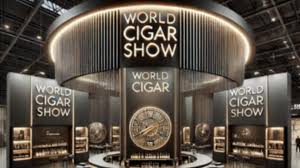Setting the Stage — A Milestone Event Unfolds
An important turning point in the tobacco industry’s regional trajectory is “World Tobacco Middle East 2025.” Professionals, decision-makers, and innovators have been waiting for a meeting that brings tradition and change together for years. As a result, stakeholders enthusiastically responded when the event organizers issued the call for participation. They acknowledged the event’s power to influence business trends and provoke thought-provoking discussion.
At the same time, the region’s dynamic economic landscape demanded a fresh platform. Thus, the exhibition emerged as a conduit for exchanging ideas, forging partnerships, and driving technological advancements. Attendees hoped to glean insights into emerging consumer behaviors, regulatory shifts, and the evolving competitive environment. As a result, anticipation built, culminating in an event that promised both prestige and impact.
Navigating Innovation — Cutting‑Edge Developments Unveiled
In the realm of product innovation, exhibitors showcased sleek, modern designs that integrated sustainability and user-friendly features. Manufacturers unveiled novel formulations aimed at reducing harmful emissions, while simultaneously preserving flavor and satisfaction. Such developments represented a clear commitment to refining the product experience through research and advanced engineering.
Technology took center stage across multiple booths. Smart vaping devices incorporated IoT-enabled monitoring, while AI-powered manufacturing solutions promised greater precision in production. Indeed, many participants demonstrated how digital transformation could enhance not only product safety but also supply chain transparency. Thus, the industry signaled that it would not rest on tradition, but rather embrace the technological wave.
Regulatory and Public Health Horizons — Policies in Transition
Public health advocates and regulatory bodies held numerous panel sessions to clarify the shifting legal landscape. They addressed tighter controls on packaging, advertising, and age verification systems. Simultaneously, they balanced economic interests with harm reduction frameworks, emphasizing that regulation must be responsive to both societal wellbeing and market realities.
Furthermore, delegates discussed how governments across the region are updating taxation models to discourage initiation. They also explored harmonized frameworks that could facilitate trade while preserving public safety. Consequently, attendees gained a clearer understanding of how policy changes would shape production strategies, marketing, and cross-border expansion. As a result, each business gained actionable insights necessary for compliance and long-term planning.

Market Trends and Consumer Dynamics — The Pulse of Demand
Meanwhile, research presentations offered deep dives into consumer preferences, signaling evolving demand patterns. Data revealed that younger adult cohorts increasingly favored smoke-free alternatives, particularly those with customizable flavor profiles. At the same time, long-standing users still valued traditional tobacco products, especially when brands emphasized authenticity and heritage.
In addition, exhibitors presented compelling evidence that regional consumer awareness of health considerations was driving interest in lower-risk alternatives. Consequently, industry leaders considered how to recalibrate their product portfolios to capture emerging niches. They also recognized that transparency and trust would become critical differentiators in a competitive marketplace. Thus, companies committed to aligning product development with evolving expectations.
Networking and Collaboration — Building Bridges Across the Region
Networking emerged as a highlight of the event, offering structured opportunities for newcomers and industry veterans to connect. Thoughtfully arranged B2B meetings helped suppliers, distributors, and regulators identify synergies. Notably, several memorandums of understanding were signed onsite, fostering joint ventures and knowledge exchange. Accordingly, these interactions reinforced the event’s reputation as a catalyst for regional collaboration.
Moreover, informal gatherings energized the experience, as over coffee, delegates exchanged experiences, best practices, and aspirations. These intimate conversations often sparked ideas that later evolved into substantive projects. Thus, the exhibition not only facilitated formal agreements but also planted the seeds of future innovation. Ultimately, such synergy underscored that momentum is as important as milestones.
Sustainability and Responsibility — Toward Ethical Evolution
Exhibitors emphasized eco-efficient manufacturing, from reduced water usage to greener packaging materials. Some showcased biodegradable filters and initiatives aimed at minimizing the industry’s carbon footprint. Consequently, the tobacco sector signaled a willingness to mitigate environmental impacts without sacrificing product quality.
At the same time, corporate social responsibility initiatives gained prominence. Companies highlighted programs aimed at supporting tobacco growers to transition toward alternative crops, improving livelihoods while reducing dependence on tobacco. Additionally, some pledged funding for community health programs, signaling a more conscientious approach. Therefore, the exhibition reflected a shift toward ethical evolution, demonstrating that the industry can balance profitability with positive social contributions.

The Role of the Exhibition Organizers — Excellence in Execution
The event’s success hinged on meticulous planning by the “World Tobacco Middle East ”Exhibition Company in Abu Dhabi. They coordinated logistics, curated content, and facilitated meaningful experiences for all participants. Their team ensured seamless execution of keynote presentations, networking sessions, and booth displays. Consequently, the event maintained professional polish from opening to closing—and set a high standard for industry gatherings.
Their transparent communication and flexibility in accommodating evolving participant needs earned widespread praise. Attendees found schedules easy to follow, sessions highly relevant, and support readily available. As a result, exhibitors and visitors alike left with a sense of satisfaction and anticipation for future rendezvous. Thus, organizer excellence amplified the event’s prestige and paved the way for sustained engagement.
Looking Ahead — Future Pathways and Long‑Term Impacts
Looking forward, the impacts of “World Tobacco Middle East 2025” will echo across boardrooms and regulatory chambers. Businesses will integrate insights into product development pipelines, marketing strategies, and operational models. At the same time, regulators may draw on shared knowledge to fine-tune frameworks that align public health with commercial viability. Therefore, the conference will continue influencing dialogues long after its final day.
Moreover, stakeholders committed to innovation, sustainability, and collaboration may convene again with renewed purpose. The event’s success suggests that future editions will attract even greater diversity in participation. Consequently, the tobacco industry—and its adjacent sectors—may witness accelerated transformation through continued exchange of ideas. Ultimately, “World Tobacco Middle East 2025” will stand as a milestone that redefined industry expectations.


